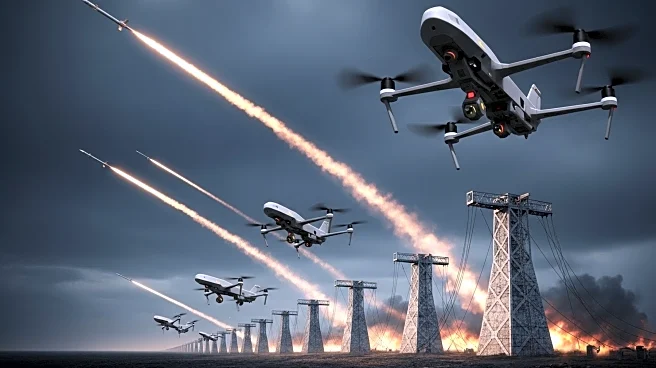What's Happening?
Russia has launched a significant air assault on Ukraine, deploying around 500 attack drones and dozens of missiles. This attack targeted critical energy infrastructure across nine regions, resulting in the deaths of at least five people, including a family of four in the Lviv region. The assault has left tens of thousands without electricity as Russia intensifies its energy warfare against Ukraine ahead of winter. The Russian Defense Ministry claimed the attacks targeted Ukrainian military-industrial complexes and energy facilities, although civilian areas were also affected. Ukrainian President Volodymyr Zelensky has called for stronger air defenses and international pressure on Russia to cease its attacks.
Why It's Important?
The attack underscores the ongoing conflict between Russia and Ukraine, with significant implications for Ukraine's energy security and civilian safety as winter approaches. The damage to energy infrastructure could lead to a humanitarian crisis, potentially causing a new wave of refugees into Europe. The situation also highlights the need for enhanced air defense systems in Ukraine, as current defenses are insufficient to protect against such large-scale assaults. The international community, particularly the U.S. and Europe, faces pressure to increase support for Ukraine, both in terms of military aid and economic sanctions against Russia.
What's Next?
Ukraine is likely to continue its appeals for more advanced air defense systems from Western allies, including the U.S. and Europe. The international community may consider imposing further sanctions on Russia to deter its military actions. Additionally, Ukraine's calls for a diplomatic resolution to the conflict may gain traction, although the path to peace remains uncertain. The ongoing attacks could also lead to increased military and humanitarian support from other nations, as the global community seeks to stabilize the region.
Beyond the Headlines
The attack raises ethical and legal questions about the targeting of civilian infrastructure in warfare. It also highlights the broader geopolitical tensions between Russia and Western nations, as well as the potential for further destabilization in Eastern Europe. The conflict may lead to long-term shifts in energy policies and alliances, as countries reassess their energy dependencies and security strategies.










